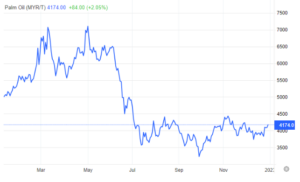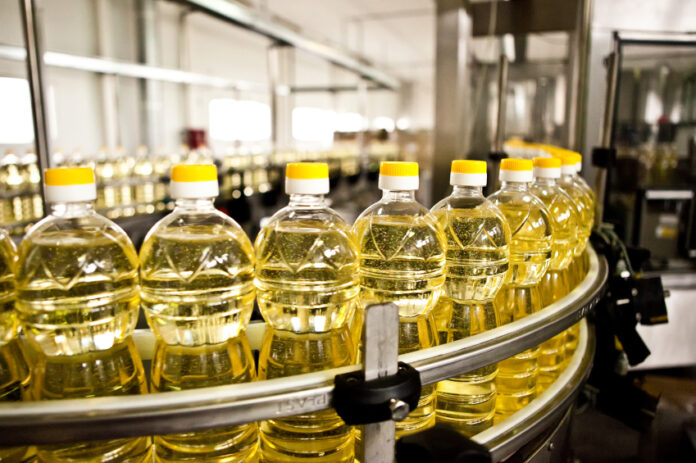One of the biggest food imports for Pakistan has historically been palm oil. Infact, Pakistan is the 4th largest importer of Palm oil and oilseeds like soyabean etc. And not just Pakistan. Palm crude is one of the cheapest oils when it comes to cooking food in most of the countries.
The year 2022 was not a walk in the park for both the producers and the consumers of palm oil. The year saw historic highs and record lows in the palm oil market causing volatility and at times losses as well.
According to the State Bank of Pakistan, Pakistan imported Palm and Soybean oil in excess of $3.3 billion this year. This is a 33% increase as opposed to the FY21. Despite import restrictions in place. Pakistan has already imported a considerably larger amount of palm and soybean oil between Jul-Nov in FY23, than it did in FY22.
Being such a major import, the prices of palm oil are almost as important as any other global commodity. Let us have a look at how the prices of Palm oil were affected throughout the last year, and how that can act as a lesson for the years to come.
How is the price of Palm oil determined:
The prices of Palm oil are determined by looking at the value of the future contracts for Palm oil. A widely accepted and used standard is the FCPO contract that is listed at the Bursa Malaysia Exchange. The value of this contract is the future price of Palm oil in the next three months.
The year 2022 started as the FCPO contract was hovering around 4400 MYR/T (Malaysian Ringgit per tonne). The value is not very different from what the value currently i.e; 4177 MYR. However during the year the prices have been on a pirate ship of their own, going up and down with each passing month.
Palm oil on the rise;
With the start of this year came the Russia Ukraine war, a phenomenon that caused fuel and commodity prices to skyrocket. Not only did the fuel prices cause a rise in the shipping cost but also increased the viability of palm oil to be used in various crude oil blends as a fuel.
In addition to that, supply shortfalls aggravated by droughts in Latin America, and labor shortages due to floods in Malaysia, collectively added up and took the prices of palm oil to a record high. The value touched the values of 6000 and eventually 7000 MYR, for the first time in history.
Why did it come down?
According to experts, the mid-year marked a period of economic recession for major importers of palm oil. The production that had attained a 3-year high was left stranded as major importers placed import restrictions.
Meanwhile, China, the single largest importer of Palm oil saw its first COVID case, igniting a new series of lockdowns. Causing the market to go completely bearish in the months to come. The prices for FCPO dipped below 4000 MYR, and uncertainty prevailed.
As seasons became favourable and rains reduced in number. The production became better in September and October showing slight changes in prices due to small and medium level shocks. This period is also considered the peak harvesting season.
The prices were considered to come down further. According to Director of an Indian consumer goods company, Godrej International, Dorab Mistry, “Palm oil was expected to trade between 3500-4500 MYR up until March” With Monsoon rain hitting the soy producing region, the prices once again went onto the higher trajectory.
Where do we stand right now?
As of Friday, the 30th of December, the last day of trading this year, the Bursa Malaysia exchange closed at the price of FCPO at 4174 MYR. The price saw a sudden rise of 4% on the last day of the year, as a senior official at the Coordinating Ministry of Maritime and Investment Affairs, Septian Setio, told media that Indonesia is likely to restrict the exports of palm oil to secure domestic supply for the first quarter of 2023. Setio said that the government will continue to evaluate the export ratio periodically, taking into account cooking oil availability and prices.
“This is (also) a preventive measure against the potential increase in domestic cooking oil prices as demand goes up during the month of Ramadan, which will fall in March and April of 2023.” said a senior official at the Trade Ministry.
Pakistan saw a large amount of imports in the last 3 months, due to low prices. But as Ramadan approaches, a similar demand side problem is faced by Pakistan as is faced by Indonesia. The prices that were jacked up during the months of March to June, have not come down as proportionally as expected.
The government which was adamant on providing relief to the importers of palm oil in March, has since left the industry rather unregulated, causing no semblance of relief in the prices of the said commodity, despite a global decrease in prices.

























Beth Dutton’s purse is the epitome of rugged elegance. Its rich leather and intricate stitching showcase her fierce yet sophisticated style, making it a statement accessory that perfectly complements her character.
Enhance your content’s impact through expertly crafted voice-over recordings. Discover top-tier services that bring your scripts to life with captivating tones and precise delivery. Whether for videos, podcasts, or presentations, these skilled professionals ensure your message resonates. Elevate engagement and quality—explore our curated selection of the finest voice-over recording options available.
Events agencies in the UAE play a pivotal role in crafting unforgettable experiences. Merging creativity with meticulous planning, they orchestrate events that captivate and resonate. From grand corporate galas to cultural festivals, these agencies curate moments that linger in memories. With a backdrop of stunning venues and a blend of innovation, they shape the UAE’s vibrant event landscape.
Despite the fact that I am not knowledgeable enough to assist you with this issue. However, I sincerely hope someone can help you out here!